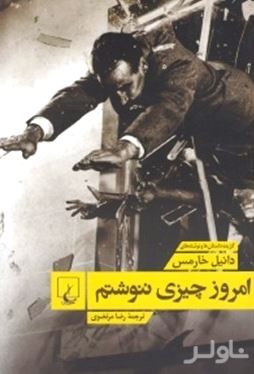
Daniil Ivanovich Yuvachev (Даниил Иванович Ювачёв) was born in St. Petersburg, into the family of Ivan Yuvachev, a well known member of the revolutionary group, The People's Will. By this time the elder Yuvachev had already been imprisoned for his involvement in subversive acts against the tsar Alexander III and had become a religious philosopher, acquaintance of Anton Chekhov during the latter's trip to Sakhalin.
Daniil invented the pseudonym Kharms while attending high school at the prestigious German "Peterschule". While at the Peterschule, he learned the rudiments of both English and German, and it may have been the English "harm" and "charm" that he incorporated into "Kharms". Throughout his career Kharms used variations on his name and the pseudonyms DanDan, Khorms, Charms, Shardam, and Kharms-Shardam, among others. It is rumored that he scribbled the name Kharms directly into his passport.
In 1924, he entered the Leningrad Electrotechnicum, from which he was expelled for "lack of activity in social activities". After his expulsion, he gave himself over entirely to literature. He joined the circle of Aleksandr Tufanov, a sound-poet, and follower of Velemir Khlebnikov's ideas of zaum (or trans-sense) poetry. He met the young poet Alexander Vvedensky at this time, and the two became close friends and inseparable collaborators.
In 1927, the Association of Writers of Children's Literature was formed, and Kharms was invited to be a member. From 1928 until 1941, Kharms continually produced children's works and had a great success.
In 1928, Daniil Kharms founded the avant-garde collective OBERIU, or Union of Real Art. He embraced the new movements of Russian Futurism laid out by his idols, Khlebnikov, Kazimir Malevich, and Igor Terentiev, among others. Their ideas served as a springboard. His aesthetic centered around a belief in the autonomy of art from real world rules and logic, and the intrinsic meaning to be found in objects and words outside of their practical function.
By the late 1920s, his antirational verse, nonlinear theatrical performances, and public displays of decadent and illogical behavior earned Kharms — who always dressed like an English dandy with a calabash pipe — the reputation of being a talented but highly eccentric “fool” or “crazy-man” in Leningrad cultural circles.
Even then, in the late 20s, despite rising criticism of the OBERIU performances and diatribes against the avant-garde in the press, Kharms nurtured a fantasy of uniting the progressive artists and writers of the time (Malevich, Filonov, Terentiev, Vladimir Mayakovsky, Kaverin, Zamyatin) with leading Russian Formalist critics (Tynianov, Shklovsky, Eikhenbaum, Ginzburg, etc.,) and a younger generation of writers (all from the OBERIU crowd—Alexander Vvedensky, Konstantin Vaginov, Nikolai Zabolotsky, Igor Bakhterev), to form a cohesive cultural movement of Left Art. Needless to say it didn't happen that way.
Kharms was arrested in 1931 together with Vvedensky, Tufanov and some other writers, and was in exile from his hometown (forced to live in the city of Kursk) for most of a year. He was arrested as a member of "a group of anti-Soviet children's writers", and some of his works were used as an evidence. Soviet authorities, having become increasingly hostile toward the avant-garde in general, deemed Kharms’ writing for children anti-Soviet because of its absurd logic and its refusal to instill materialist and social Soviet values.
He continued to write for children's magazines when he returned from exile, though his name would appear in the credits less often. His plans for more performances and plays were curtailed, the OBERIU disbanded, and Kharms receded into a very private writing life. He wrote for the desk drawer, for his wife, Marina Malich, and for a small group of friends, the “

|
نویسنده :
دانیل خارمس
ناشر :
ققنوس
۴/۴ از ۵
|
۱ | ۲ |